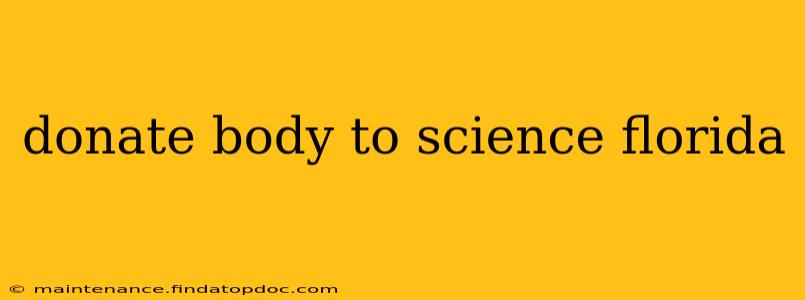Donating your body to science in Florida is a significant decision, offering a valuable contribution to medical research and education. This guide provides comprehensive information to help you understand the process, requirements, and considerations involved.
What Does it Mean to Donate Your Body to Science?
Donating your body to science, also known as whole-body donation, means bequeathing your remains to a medical school or accredited research institution after your death. Your body will be used for anatomical study, research in various medical fields, and training future medical professionals. This selfless act significantly advances medical knowledge and improves healthcare practices.
How to Donate Your Body to Science in Florida?
The process varies slightly depending on the institution, but generally involves these steps:
-
Identify an Accepting Institution: Several medical schools and research institutions in Florida accept whole-body donations. Research specific institutions and their requirements. Contact them directly to inquire about their acceptance policies, procedures, and any associated costs (some institutions may cover transportation and preparation costs).
-
Complete the Necessary Forms: Each institution will have its own donation form. This form usually details your medical history, wishes regarding organ donation (if applicable), and other pertinent information. Accuracy and completeness are crucial.
-
Legal Execution: Ensure the donation is legally binding. This often involves having the form witnessed and notarized. Some institutions provide guidance on this process.
-
Inform Your Family: It's vital to inform your family of your decision. This ensures a smooth process after your passing and prevents any misunderstandings or conflicts. Open communication is key.
-
Notification After Death: After your death, your designated contact person must notify the chosen institution as soon as possible. They will then arrange for the transportation and processing of your remains.
What Happens to My Body After Donation?
Following your death, your body will be transported to the designated institution. It will undergo a thorough examination, dissection, and potentially be used for various educational and research purposes. The exact procedures will vary depending on the needs of the institution and the specific research projects underway. After the completion of its use, the remains are typically cremated, and the ashes are either returned to your family or scattered according to the institution's policy.
What are the Costs Associated with Donating Your Body to Science?
Some institutions cover all costs associated with transportation and preparation of the body. However, others may require some financial contribution from your family. It's crucial to clarify the financial obligations with the specific institution you choose before you make your decision. Transparency is paramount.
Can I Donate My Body if I Have a Specific Medical Condition?
Many institutions accept bodies with various medical conditions. However, some conditions might limit the suitability of your donation. It is essential to discuss your medical history openly and honestly with the institution to determine your eligibility. They will assess your suitability based on their specific needs and research requirements.
What if I Change My Mind After Registering?
You have the right to withdraw your donation at any time. Simply contact the institution and inform them of your decision. They will update their records accordingly.
Is There an Age Limit for Body Donation?
There is generally no strict upper age limit, but institutions might have specific criteria depending on the condition of the body and the research needs. Contact the institution directly to inquire about their age-related requirements.
Can I Specify What Research My Body Will Be Used For?
While you can't directly dictate the specific research, you can express preferences regarding the type of research you'd like to support (e.g., cardiovascular research, oncology). However, the final decision rests with the institution based on their current research needs.
Donating your body to science is a deeply personal decision. This guide provides a framework for understanding the process in Florida. Remember to thoroughly research the institutions, ask clarifying questions, and ensure you understand the complete process and implications before making your commitment. Remember to always contact the institutions directly for the most up-to-date and accurate information.
